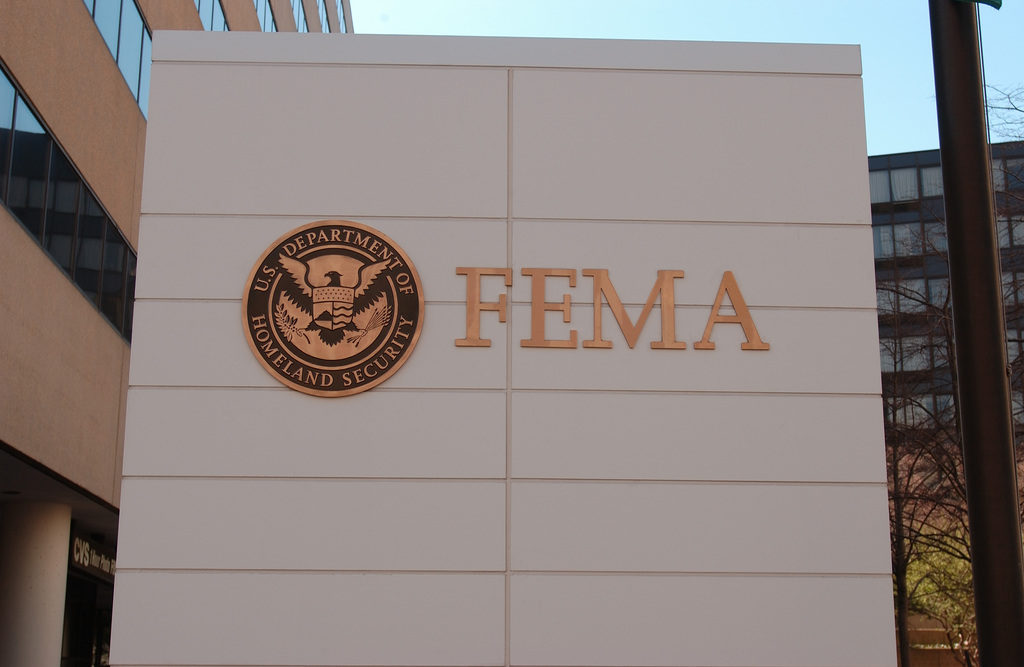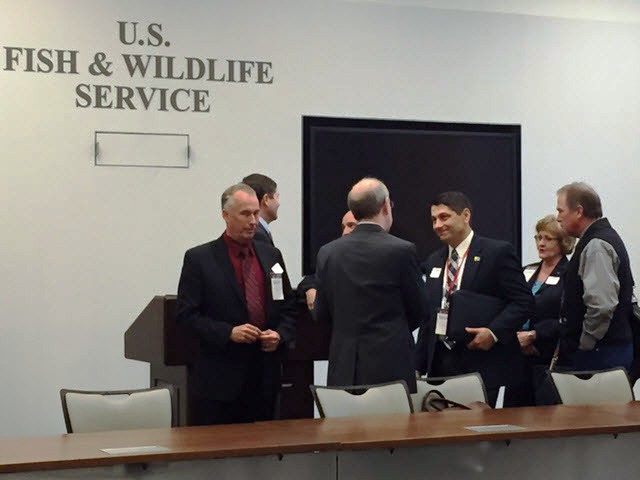
For many cooperatives, some of the most important conversations with federal officials during the recently concluded NRECA Legislative Conference occurred away from Capitol Hill.
Nearly 100 electric cooperative leaders visited key federal agencies, where they talked with officials about issues ranging from endangered species designation to disaster relief.
“Our board of directors felt it was important to make sure we are looking out for the interests of our co-op,” said Bill Carson, manager of member services at North Plains Texas Electric Cooperative in Perryton. The meeting organized by NRECA at the Federal Emergency Management Agency gave him the opportunity to do that, he said.
Co-op leaders also met with officials at the U.S. Forest Service, the Bureau of Land Management and the U.S. Fish and Wildlife Service.
Carson recounted to FEMA officials how the federal disaster declaration process can work against rural areas. His co-op suffered $13.8 million in damages from a January ice storm but failed to meet FEMA’s relief threshold for Texas, he said.
“I directly asked the question: Do I need to tell Texas co-ops you’re not going to be there for us?” said Carson.
FEMA told co-op leaders that the agency will provide coverage for large-scale events such as hurricanes, but is still exploring changes in mitigation for lesser events, Carson said. “We talked about insurance, line design, underground versus overhead, maintenance. We just really need to continue this conversation,” he said.
Iowa co-ops thanked FEMA for reversing a regional administrator’s decision denying them about $15 million in disaster relief from a 2013 ice storm. FEMA also extended the recovery deadline to the end of 2018, capping a nearly four-year appeals process for Iowa co-ops.
“The Iowa delegation went to FEMA headquarters just to say ‘thank you,’ ” said Chuck Soderberg, executive vice president of the Iowa Association of Electric Cooperatives.
For both Carson and Soderberg, the meeting was their first at FEMA in Washington.
“It was refreshing to see the participation of the RECs throughout the country sharing their issues, their concerns with FEMA funding and the processes used,” said Soderberg. “Hopefully, FEMA will listen and consider changing the funding parameters as they make decisions over the next year or two.”

Alex Amparo, FEMA assistant administrator for recovery and an NRECA Youth Tour alum, applauded co-ops’ dedication to their members.
“FEMA always appreciates the opportunity to meet with the nation’s electric cooperatives,” said Amparo. “As someone who grew up on co-op lines, I value the service they provide and commend them on their focus of getting the lights back on quickly after a disaster.”
Shane Laws, CEO of The Victory Electric Cooperative in Dodge City, Kansas, told Fish and Wildlife Service officials that the Endangered Species Act should be updated to recognize extensive voluntary conservation efforts.
Victory is a member of a five-state, $50 million range-wide plan developed in part by co-ops to protect the lesser prairie-chicken and prevent its federal listing.
“We feel we are being responsive without unnecessary mandates,” Laws told the agency officials.
Gary Frazer, USFWS assistant director for ecological services, told the co-ops to speak up when guidelines or processes at the regional or local offices draw concerns.
“There needs to be practical mitigation management. You do have options. I encourage you to be vocal,” Frazer said.
The agency is reassessing the status of the lesser prairie-chicken and evaluating regional data and the range-wide plan to determine if federal listing is again warranted. Last year, a federal court vacated the agency’s listing of “threatened,” but another petition to list the species and litigation by environmentalists for a listing of “endangered” remain active.
The Fish and Wildlife Service determined in 2015 that listing the greater sage grouse was unwarranted, based on efforts to protect it across its 173 million-acre range. Management by landowners and agencies “made a real difference,” Frazer said. “From our perspective, the bird is being managed well by all the players.”
“That’s really wonderful news. There are 26 co-ops in Montana. Every one of those co-ops has an avian protection plan in place,” DeeDee Isaacs, president of the Tongue River Electric Cooperative board of directors, told Frazer.
About 50 co-op leaders met with the Bureau of Land Management’s Robert Jolley, division chief for lands, and Dick Bouts, senior energy program analyst, on vegetation management issues that prohibit right-of-way maintenance.
At the U.S. Forest Service, 40 co-op members discussed their concerns about being prohibited from managing dead trees adjacent to rights of way, high costs related to forest fire suppression and extensive permitting delays.
Cathy Cash is a staff writer at NRECA.